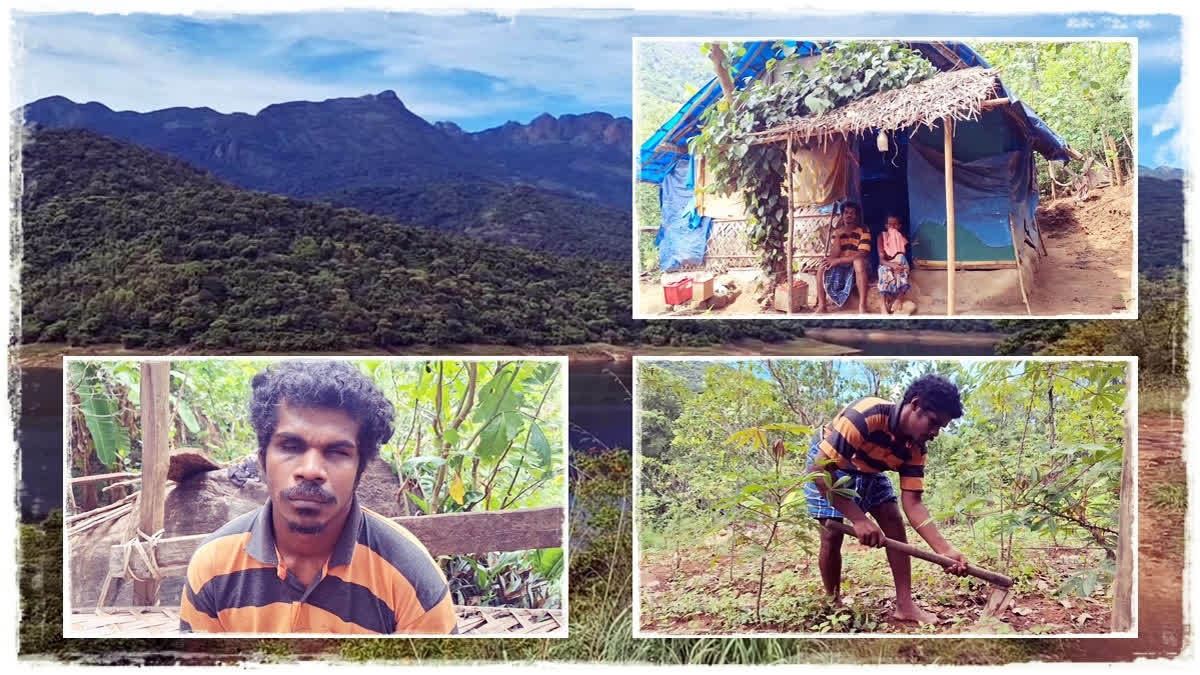Tirunelveli (Tamil Nadu): Living in the idyllic jungle, far off from the maddening urban life, Murugesan goes about his routine, picking up the spade early in the morning. He grows tapioca and plantain in the half-acre farmland, which also houses his small hut of mud walls covered with tarpaulin. Loss of vision in both eyes when he was a child was no impediment for him to engage single-handedly in farm work, rather it has become an obsession.
Deep inside the imposing mountains and jungles with streams, the terrain is uneven, interspersed with rocks and boulders. Furthermore, there are frequent visits of tigers and leopards as well as bears, deer and boars. Nestled in this lush green natural habitat, is Periya Mylar, one of the tiny five hamlets in the Western Ghats of Tirunelveli district. But, for adventurous people, these hamlets inside the thick jungle with a population of 400 remain largely inaccessible. For, vehicles could go only up to the Karaiyar dam. After crossing the 4 km long dam, one has to walk 10 km to reach Injikuzhi and Periya Mylar is a little 6 km farther.
Though these tribes have been there for centuries, lack of transport facilities and denial of land deeds have forced most of the families to come down to the areas adjoining the dam. The 158 families still residing in the remote villages trek every week for long distances to get rations and sell their produce. Murugesan's family is among the nine families at present in Periya Mylar. Raised by his mother, Pandiammal, a single parent, he initially tried his hand at farming to help his mother, but it later turned out to be a passion.
Also read: Scientists discover new family of bony fish in western ghats
“When he was a one-and-a-half-year old, he was bedridden due to severe fever, which took away his eyesight in both eyes. There is no medical facility in the area even now. On the suggestion of neighbours, I took him to the local priest and he applied sacred ash on him. The fever subsided and he also recovered, but what was lost could not be regained. “Murugesan is my younger son. My husband left us and married another woman. And I had raised him singlehandedly, taking along the rocky terrain and infusing him with self-confidence. From the age of 15 years, he started moving around in the jungles alone without any help,” says Pandiammal.
From removing the weeds to tending the plants, he does his work as a normal person. Not only that, he harvests them and sends the produce for sale. Furthermore, he had put up fences around his farm to ward off wild boar, deer and other wild animals. Also, he raises an alarm by beating a tin box at regular intervals. The tin fixed to a pole in the farm is tied to a long rope from where he sits near his hut. Like those in the Kani community, he largely raises tapioca besides plantain. Since tapioca from the hills has a demand for those making chips, he dries up the tapioca and sells them for Rs 90 a kg.
“I am leading a happy life. With my experience and familiarity with the terrain, I can go anywhere in the forest alone without anyone's help. Both my legs are my eyes and God has given me this skill. I know the forest and that knowledge I had gained all these years. I have never applied for any agricultural loan or assistance from the government. If the crop is destroyed by wild animals, I could not repay the loan received from the government. I am neither interested in moving out as this place is part and parcel of my life and personality. Somehow, I cannot imagine settling in a town. The air is clean, the water is pure. What else is needed? Tapioca is enough to feed us. Despite the challenges, my only aspiration is to remain wedded to my farm till my last breath and stand on my own,” says the proud farmer, appealing to the government to provide them with concrete houses. Well, loss of vision hasn't robbed him of his self-confidence.



